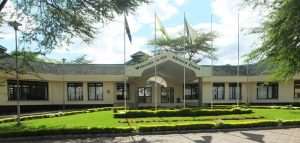
An intense competition is underway between Senegal and Nigeria for the remaining single slot to represent the West African Zone on the African Court on Human and Peoples' Rights. The West African Zone already has a Judge from Ghana on the African Court.
Judge Marie Odile Thiakane Ndiaye from Senegal and Judge Stella Isibhakhomen Anukam from Nigeria are vying for the position, with Judge Anukam having an advantage due to her previous experience on the court.
An analysis of the process to fill the three vacancies by the Communication for Development and Advocacy (CDA Consult), [email protected], which is a development communication advocacy non-governmental organization based in Tema, Ghana, has revealed.
According to the CDA Consult analysis, Judge Thiakane has however garnered significant support from the Senegalese government, making the contest highly competitive.
According to the African Union modalities, three judges would end their terms at the African Court at the end of July this year that needed to be filled: Judge Ben Kioko (Kenya) completes his second term and should be replaced by a male judge from East Africa.
Judge Blaise Tchikaya (Republic of Congo) and Judge Stella Isibhakhomen Anukam (Nigeria) are ending their first terms and are eligible for re-election to another six-year term.
Judge Blaise Tchikaya from Congo, representing the Central Africa Zone, seemed to be going through as there was no judge from the zone competing with him.
To replace Judge Kioko from Kenya, who represented the Eastern Africa Zone, Judge Duncan Gaswaga (male) from Uganda and Judge Samuel Mbithi Kimeu (male) from Kenya are vying for the slot.
According to CDA Consult analysis and monitoring of the events, the election has sparked intense campaigns from governments and civil society groups in Uganda, Kenya, Senegal, and Nigeria, all vying for their candidate to secure the slot.
The African Union's Executive Council is set to elect one candidate from each of the three zones (East, West, and Central Africa) to fill the vacant positions on the court.
Meanwhile the African Human Rights Mechanisms: Nomination and Selection Initiative, also known as ‘the Arusha Initiative,’ has upscaled a campaign to ensure that qualified candidates among the lot get elected to serve on the African Court.
The aim of the campaign is to assist the State Party-led nomination process by identifying experts who meet the criteria for serving at the African Court. Given the current geographical composition of the African Court, nominations are open from the East Africa, West Africa, and Central Africa regions.
In a statement jointly signed in Arusha, Tanzania, by Ms. Sophia Ebby and Mr. Ikechukwu Uzoma, co-chairs of the Arusha Initiative, and made available to the Communication for Development and Advocacy (CDA Consult), [email protected], which is a development communication advocacy non-governmental organization based in Tema, Ghana, stated.
Each mechanism comprises eleven members nominated by African States and elected by the Executive Council of the African Union. The Arusha Initiative explained and called on members to share profiles of qualified experts.
The African Human Rights System consists of three mechanisms: the African Commission on Human and Peoples’ Rights, the African Court on Human and Peoples’ Rights, and the African Committee of Experts on the Rights and Welfare of the Child.
Qualified candidates for this position must be individuals of high moral character with recognized expertise in human and people's rights.
Such candidates must have practical, judicial, or academic competence in human rights and be independent of political, diplomatic, or administrative functions in their countries.
The Arusha Initiative: The African Human Rights Mechanisms Nomination and Selection Initiative (the Arusha Initiative) is aimed at promoting human rights by supporting State Parties in the nomination and selection of members of human rights mechanisms in Africa.




 They made it seem I intentionally spotted the child with telescope and killed hi...
They made it seem I intentionally spotted the child with telescope and killed hi...
 KT Hammond to lay LI on cement price regulation after manufacturers boycotted st...
KT Hammond to lay LI on cement price regulation after manufacturers boycotted st...
 Reserve a quota for cadet corps when recruiting - Bawumia tells security service...
Reserve a quota for cadet corps when recruiting - Bawumia tells security service...
 My dollar advice was honest, not speculative – Isaac Adongo replies Dr. Amin Ada...
My dollar advice was honest, not speculative – Isaac Adongo replies Dr. Amin Ada...
 Free SHS Bill: Lack of rigorous stakeholder consultation unfortunate – Minority
Free SHS Bill: Lack of rigorous stakeholder consultation unfortunate – Minority
 ‘You’ll lose our votes if you stick with 'arrogant' NAPO as running mate’ – Pro-...
‘You’ll lose our votes if you stick with 'arrogant' NAPO as running mate’ – Pro-...
 Akufo-Addo being insensitive to Ghanaians' plight with continuous ministerial ap...
Akufo-Addo being insensitive to Ghanaians' plight with continuous ministerial ap...
 ‘We will not, and cannot be part of this process’ – Minority boycotts vetting of...
‘We will not, and cannot be part of this process’ – Minority boycotts vetting of...
 Election 2024: We’ll win based on loyalty, dedication of our members — Fifi Kwet...
Election 2024: We’ll win based on loyalty, dedication of our members — Fifi Kwet...
 Nine out of every 10 Ghanaian rents yet gov’ts have failed to address the challe...
Nine out of every 10 Ghanaian rents yet gov’ts have failed to address the challe...
